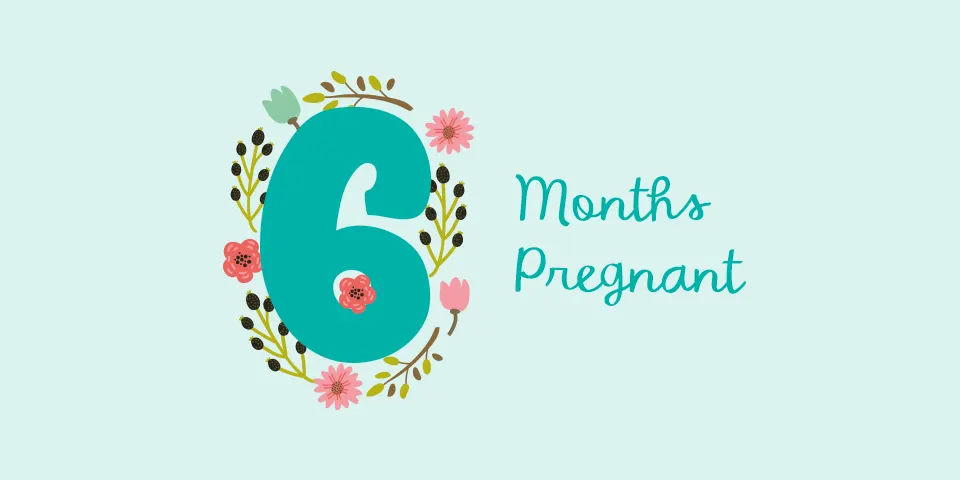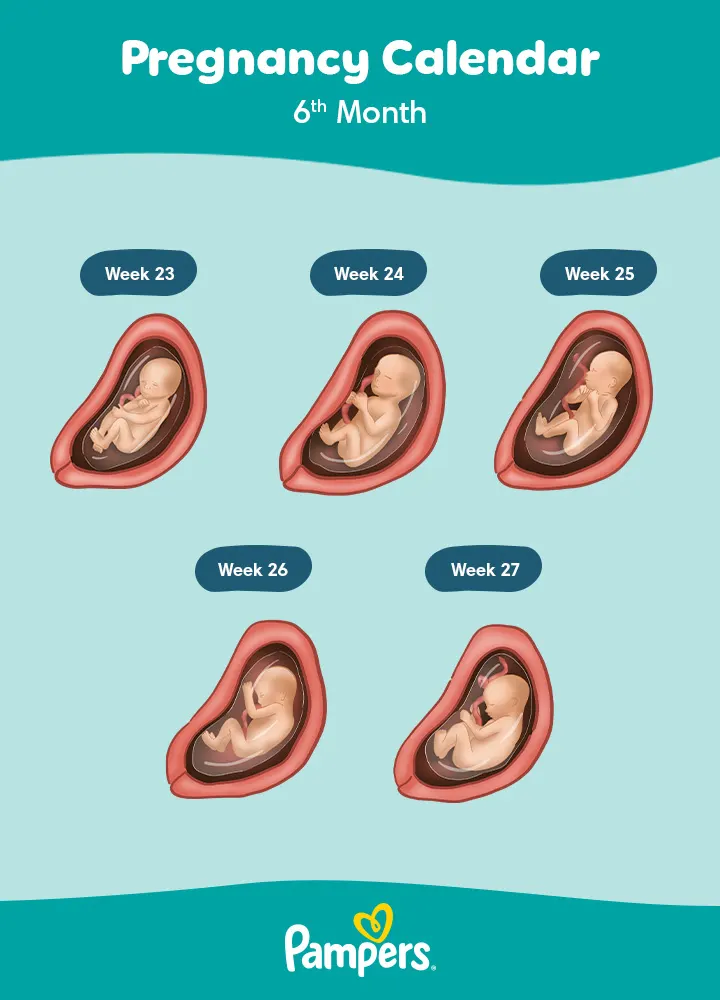6 Months Pregnant: Symptoms and Foetal Development
Key Takeaways
At six months pregnant, you’re tail-end of the second trimester. The surge of energy you may have been enjoying recently may start to wane as your bump grows. Read on to find out how to make these symptoms a little less challenging at six months pregnant, and what else is in store for you and your little one at this stage.
Symptoms at 6 Months Pregnant
You may not experience any or all of them, but these are some of the common pregnancy symptoms at six months pregnant:
Heartburn. You may already be no stranger to bouts of indigestion, caused by the hormonal changes you experienced in the first trimester. Now there’s another factor in play: At six months pregnant and after, as your uterus grows and moves upwards it can put more pressure on your stomach, making you even more prone to this common symptom. You may be able to keep the symptoms of heartburn in check by eating smaller, but more frequent meals. It’s also a good idea to cut down on fatty, rich or spicy foods, and drink less coffee or other drinks that contain caffeine. Staying upright helps too, so sit up straight when you’re eating, and sleep with your head and shoulders propped up a little. Ask your doctor or midwife before taking any over-the-counter heartburn medicines.
Back pain. As your bump grows outwards at six months pregnant, your centre of gravity shifts forwards. Added to this, the ligaments in your back and pelvis have been softened and relaxed by pregnancy hormones, in preparation for labour. All this is a recipe for backache, as the muscles in your lower back work harder to maintain good posture. Help prevent back pain by bending at the knees if you have to pick something up. Wearing flat shoes will help distribute your weight more evenly. It’s also important to keep your back supported when lying or sitting for longer periods. Getting plenty of rest, and a massage, or perhaps some sessions of pregnancy yoga, can help to relax and tone those overworked muscles.
Feeling overheated. The extra blood being pumped around close to your skin (among other reasons), can leave you feeling a little warmer than usual. Try wearing loose clothing made of natural fibres and use a fan to cool your room if it seems a little stuffy. Frequent showers can also keep you feeling fresh.
Feeling faint. If you get the occasional giddy spell, especially when you stand up from a seated position or get out of the bath too quickly, it’s probably those hormones again. If you feel faint, quickly find somewhere to sit down and wait for it to pass. If this doesn’t help, lie on your side. Lying on your back isn’t recommended, especially in the later stages of pregnancy, as it can interfere with the flow of blood to your foetus.
Leg cramps. Nobody fully understands why they happen, but these uncomfortable muscle spasms in the calf or foot are quite common in the later stages of pregnancy. You might not be able to stop cramps altogether; but staying hydrated and doing exercises to stretch your calf muscles – especially before you go to bed – can help reduce the number of spasms.
Swollen feet and ankles. At around six months pregnant, your uterus – including the foetus, placenta, amniotic fluid and everything else it contains – is getting heavier. This can put pressure on the veins supplying your lower body, causing extra fluid to build up in your feet, ankles and legs as the day goes by. Gradual swelling is usually OK, but if you experience sudden swelling call your midwife or doctor, so they can rule out a rare but serious blood pressure condition called pre-eclampsia. If your shoes are starting to pinch, trade up to a bigger, more comfortable pair. Drink plenty of water to flush the excess fluid out of your system, and rest frequently with your feet up. Taking walks, or doing other forms of gentle exercise can also keep your circulation going strong.
Your Baby’s Development at 6 Months
At six months pregnant, you’re probably used to your little one’s kicks and somersaults, but you may also feel him or her move suddenly in response to a loud noise outside your belly. You foetus isn’t just listening in: The eyes are also opening for the first time around now, and it won’t be long before the blinking reflex kicks in. Eye colour can change after birth, so you won’t know the final colour of those peepers until several weeks or months or after your baby’s born. Read more about how baby eye colour can change over time. And, contrary to common belief, your baby’s eyes may not necessarily be blue when your little one first comes into the world. You might be surprised to learn that your foetus is now taking tiny sips from the amniotic fluid, and then passing it out again as urine. That’s right: your little one is already weeing! Until birth, all the nutrients your foetus needs will continue to be supplied by the placenta, but in the meantime that brand new digestive system is putting in some practice so it will be primed and ready once you start breastfeeding or formula-feeding your newborn baby.
How Big Is Your Baby When You’re 6 Months Pregnant?
Wondering about your foetus’s size when you’re six months pregnant? Your foetus could go from about the size of an ear of corn (measuring close to 30 centimetres from head to heel, and weighing in at around 600 grams) to about the size of a head of lettuce (measuring close to 37.6 centimetres from head to heel, and weighing in at around 1 kilogram) this month.
What Does a Foetus Look Like at 6 Months?
Check out these illustrations for a glimpse at what your foetus might look like when you’re six months pregnant:
Changes to Your Body at 6 Months Pregnant
Your changing body and growing belly at six months pregnant could be bringing on some lifestyle changes, as you may now have to adapt to some of the symptoms of this stage of pregnancy. Some of these little changes might include having to eat smaller, but more frequent meals to avoid indigestion, as your uterus starts pushing up against your stomach. You may also be getting tired more easily, so allowing for plenty of rests when planning your day could be a good strategy. Keeping up some form of moderate exercise while you’re pregnant, and sticking to a healthy, balanced diet can make you better prepared to handle some pesky pregnancy symptoms. At six months pregnant, as your bump grows and your centre of gravity changes, certain activities, like your usual exercise routine or even sleeping, can become a little more difficult. Another of these activities is sex. If you and your partner are comfortable with it, sex is usually perfectly safe at six months pregnant and beyond. You might have to experiment with some new positions to accommodate your belly and changing body shape, though. Also, keep in mind that both you and your partner’s sex drive may change during your pregnancy, so it’s important to talk things through with each other if there’s any uncertainty.
How Far Along Are You at 6 Months Pregnant?
There’s no really accurate way of calculating how many weeks pregnant you are at the end of six months, because months don’t usually last for exactly four weeks each and the 40 weeks of pregnancy can be split in different ways to create the 9 months. As a rule of thumb, though, at six months pregnant you’re about 24 to 28 weeks pregnant. At the end of this month, you’ll enter the third trimester, which runs from 28 weeks until you give birth.
FAQs at a Glance
At six months, your foetus is fully formed and weighs around one kilogram. From now on, your little one will continue to grow and mature inside your belly, building up a layer of insulating fat under the skin.
Checklist for When You’re 6 Months Pregnant
Schedule a dentist check-up, if you haven’t been in the past six months. You may be eligible for free dental care under the NHS.
If hypnobirthing is something you might like to try, find and book a spot in a hypnobirthing class.
If you like the idea of having a labour support person, called a doula, during childbirth, it’s time to start researching and interviewing potential doulas so you find one you feel comfortable with.
If you now know whether you’re having a boy or girl, you may wish to hold a gender reveal party to share your special news with loved ones. Check out these articles on how you can make the gender reveal moment fun and memorable:
As your bump grows and your pregnancy progresses you may have some questions about sex during pregnancy. Speak to your doctor or midwife about any specific questions you have and keep the lines of communication open with your partner.
If a baby shower’s being held for you, use our handy checklist to set up your baby shower registry. Your shower host will need the registry details before sending out the invitations, so ask her when she needs your finished registry list by.
There’s still time to plan a ‘babymoon’, as long as you get the all-clear from your doctor or midwife. If you’d like to fly, check your airline’s policy on flying when pregnant before booking any air tickets. Read more about flying and travelling when you’re pregnant. Alternatively, you could go somewhere locally and enjoy a few days of rest. You deserve it!
Keep searching for the perfect name for your little one, using our Baby Name Generator.
If you haven’t yet settled on a colour scheme or decoration ideas for your baby’s room, check out some of these great nursery theme ideas.
Sign up for even more weekly pregnancy tips here:
6 Months Pregnant - checklist


